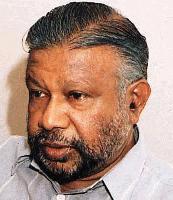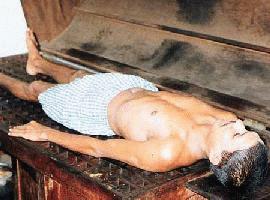




The Ayurvedic Hospital in Nawinna is offering hope to many patients, reports Chamitha Thilakaratne
Built under the tranquil shade of medicinal plants, the Bandaranaike Memorial Ayurvedic Institute at Nawinna was declared open by Indian Premier Jawaharlal Nehru in October 1962 and came into being under the Colombo Plan. Though not catering to large numbers, it has, over the years, developed an enviable reputation both for the treatment and propogation of Ayurveda.
 Dr. Pilapitiya
Dr. Pilapitiya
"The institute was meant for research purposes and it was Pundit
Shiwasharma who showed the way for its development under the Colombo Plan,"
said Dr.Upali Pilapitiya, Director of the hospital.
The hospital has three wards, male, female and a special ward for priests. Another ward for children is also being planned. Among the many illnesses the hospital specializes in treating are arthritis, asthma, drug addiction, skin diseases, hydro-cephalus, chronic headaches, sciatica and other nervous disorders, diabetes and many more.
Located on a 14 acre property, the Ayurveda Hospital has a 'patient friendly' atmosphere, which many say has contributed much to its success rate. Unlike in any other hospital, patients are allowed to walk about in the garden and enjoy the healing calm and fresh air. Entering the premises one is apt to forget that it is a hospital, instead one feels as if one is visiting an estate bungalow far away from the city. While patients have been supplied with all the modern facilities such as a TV.sets, fans and mosquito nets, they are also given the freedom to play a game of checkers or cards and have a little bit of relaxation on their own.
W. Pathiratna, a diabetes patient, said coming to the hospital had none of the tension one usually associates with the experience. "I feel more like I'm coming for a holiday rather than for treatment." Mental relaxation is very important for any kind of treatment and the patients at the Ayurvedic hospital are encouraged to experience this as part of the cure.
 While individual food tastes are catered for, patients are subjected to
traditional methods used by physicians even beyond the Anuradhapura era. One
can witness a 'beheth - oruwa' where the medicinal oils are applied to the
patient and he has a traditional steam bath. Here the patient lies down on a
wooden bed which has holes through which the steam reaches the patient. The
patient is covered with another wooden cover in such a way that only the head
of the patient is visible. (Pic)
While individual food tastes are catered for, patients are subjected to
traditional methods used by physicians even beyond the Anuradhapura era. One
can witness a 'beheth - oruwa' where the medicinal oils are applied to the
patient and he has a traditional steam bath. Here the patient lies down on a
wooden bed which has holes through which the steam reaches the patient. The
patient is covered with another wooden cover in such a way that only the head
of the patient is visible. (Pic)
The hospital has 14 doctors for its approximately 50 patients. "The patients admitted are carefully selected to suit our research needs," said Dr. Pilapitiya. " Our approach is holistic and we give individual attention and have special clinics for specific illnesses. Lack of medicines have prevented the hospital staff from helping more patients," he added.
The methods of treatment are still the same as those used by the 'weda- mahaththayas' of yore. But where treatments are concerned, one of the main problems facing the progress of indigenous medicine is the lack of space to grow the medicinal plants especially those facing extinction. "People need to be educated about the varieties of medicinal plants and be encouraged to grow them in their gardens at home," Dr. Pilapitiya said.
"Around 200-300 plants are required for the hospital's day to day needs. The ordinary person cannot make these medicines. One needs to be trained to identify the plants and then to add the right amount of each ingredients. Quality control and checking at different levels are all important. There is also a need for trained staffers to prepare the medicines. This is not an easy task since one has to be taught as to what plants are poisonous and what plants are medicinal," Dr Pilapitiya said.
"At present the hospital receives its supplies from four gardens where Ayurvedic medicinal plants are cultivated at Nawinna, Pattipola, Girandurukotte, Badgoda, and Janakala Kendreya. Still several plants are rare and there is never enough plants for the demand. Apart from the local demand, even in the West, the interest of foreigners in this field is growing," Dr Pilapitiya pointed out.
There are many misconceptions in relation to Ayurvedic medicine. The majority feel that there are treatments for all kinds of illnesses in the Ayurvedic medicines while some seem to think that in Ayurveda medicines one can cure without surgery.
"This is wrong," said Dr. Pilapitiya. "In the Ayurvedic books they have specifically stated that certain illnesses cannot be cured and that certain diseases need to be handled by a surgeon.We don't do major surgery here. But we do treat certain psychiatric diseases."
The hospital functions in three units, the clinical, literary research and plant sections. There are various clinics such as the eye clinic, fracture clinic etc that are open to the public. The literary research section looks into the old manuscripts to identify methods prescribed by our old Veda mahathayas centuries ago. No easy task, since they are written in Sanskrit. The plant section studies the growth and the use of each plant.
Mallika Nandani (41) said she had received Western medical treatment for a swelling in her legs. This is an illness where the blood cells have been destroyed which had resulted in the swelling of the legs. "However, it was not successful and I decided to seek Ayurvedic treatments." Less than three weeks later, the swelling had subsided considerably. Dr.Lakshmi Senaratna, Assistant Director of the hospital said that they have been able to re-develop blood cells in her legs.
Praveen Madushankar who is ten years old is suffering from a disease which has drained all his energy, leaving him weak and small. His mother related that he was not like other children, lacking the usual energy and bounce. " We gave him western medicine but it did not work and around three months back we brought him to the Ayurvedic hospital. Today he is able to play and run about like other children although he is yet recovering," Madushankar's mother said.
D.W.Albert who is fifty years old and a father of seven from Matara, was admitted to the hospital for a large wound at the rectum.
He had been operated several times but was never cured. "It was only after arriving here at the Ayurvedic Hospital and receiving treatment that I feel a little better. I have been here for four months and already I feel there is an improvement though the wound is yet to be totally cured," he said.
According to Dr.Pilapitiya there are many waiting in line for admittance to this hospital. The fact that people have come to have faith and confidence in the local traditional methods today is encouraging in an era where there is more emphasis on things western.
The Ayurvedic hospital renders a service for not only those who cannot afford to get specialized treatment at private hospitals but to those who refuse to seek other treatment.
Being a research hospital they publish several leaflets and books on how the public could control and cure themselves of certain illnesses.
Mrs. Lalitha Gunarathna, one of the doctors at the hospital said that she recently released a booklet based on her research on the protection and treatment of catarrh. The booklet provides information on how patients can control their illness without the use of medicines but through their diet.
Return to the Plus page 8 - Independence Day: It's only a movie * I shared Woody with psychiatrist, says Mia Farrow
Return to the Plus contents page







Please send your comments and suggestions on this web site to
info@suntimes.is.lk or to
webmaster@infolabs.is.lk